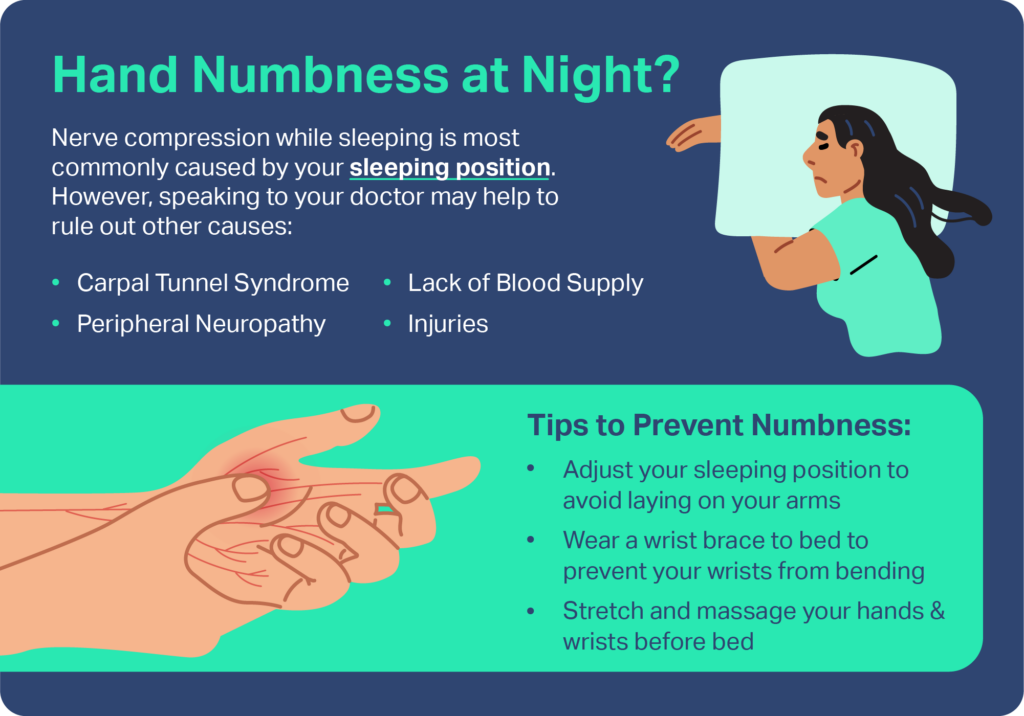When you buy through our links, we may earn a commission. Products or services may be offered by an affiliated entity. Learn more.
Numbness in Hands While Sleeping
At a Glance
The most common causes of your hands going numb while you’re sleeping include:
- Sleeping position
- Carpal tunnel syndrome
- Peripheral neuropathy
- B12 deficiency
- Thoracic outlet syndrome
- Cervical spondylosis
- Alcohol use disorder
- Lack of blood supply
- Injuries
- Other medical conditions like stroke, multiple sclerosis (MS), fibromyalgia, or Raynaud’s disease
Have you ever woken in the night to find that your hand has gone numb or “fallen asleep”? If so, you’re not alone. About a third of adults wake up at least once a week with numbness or tingling in their arms, wrists, or hands—a phenomenon known as nocturnal paresthesias .
For most people, waking up with numb hands once in a while is not cause for concern. However, if your symptoms greatly interfere with sleep or persist after you are up and moving, it may be time to see a doctor.
Causes of Hand Numbness While Sleeping
Numbness—and the tingling or “pins and needles” feeling that often accompany it—is usually the result of nerve compression, nerve damage, or another problem that interferes with the nervous system.
If you wake up with hand numbness, your body is sending you a message. It’s important to figure out what’s causing the numbness so that you can take action to relieve your discomfort and protect your nervous system.
Sleeping Position
Certain sleeping positions can compress nerves in the hand, wrist, arm, or elbow, producing numbness and tingling. Additionally, some positions that put pressure on the hands can cut off or reduce blood flow, causing the nerves in that area to temporarily stop sending signals.
You’re more likely to experience nerve compression or lack of blood flow that leads to hand numbness if you sleep with your:
- Wrists curled inward
- Hands under your face or head
- Head on your forearm
- Torso on top of your arm
- Head on a pillow that causes misalignment of the spine
Stomach sleeping has been associated with nerve compression, and while the research on side sleeping is mixed, some experts say this position is least likely to produce numbness in your hands, as long as your wrists are straight.
Looking to improve your sleep? Try upgrading your mattress.
Carpal Tunnel Syndrome
Carpal tunnel syndrome is a very common nerve injury that causes numbness, tingling, and pain in the wrist, thumb, index finger, and middle finger. It occurs when tendons in the wrist become inflamed and compress the median nerve. People with carpal tunnel syndrome often find that their symptoms get worse at night and that they experience relief when they shake their hands.
Injuries can cause carpal tunnel syndrome, but it may also develop as a result of activities that require repetitive movements of the hand and wrist, such as working on an assembly line, knitting, or playing golf. Additionally, people with the following medical conditions are particularly vulnerable to carpal tunnel syndrome:
Peripheral Neuropathy
Peripheral nerves allow your body and brain to communicate with each other, and if something damages those nerves, you might experience tingling, burning, or numbness in your hands and extremities. This condition is called peripheral neuropathy.
Potential causes of peripheral neuropathy include diabetes, infections, autoimmune disorders, vitamin deficiencies, side effects from medications, alcohol use disorder, and exposure to toxins.

B12 Deficiency
Vitamin B12 is essential for healthy nerve function, and a deficiency can lead to nerve damage and sensory disturbances, including numbness or tingling in the hands and feet . It can worsen during sleep when reduced movement and poor circulation make symptoms more noticeable.
B12 deficiency may develop gradually and is more common in older adults, people with certain gastrointestinal conditions, or those following a strict vegan diet. Blood testing and supplementation can help restore healthy B12 levels and reduce symptoms over time.
Thoracic Outlet Syndrome
Thoracic outlet syndrome (TOS) occurs when nerves or blood vessels are compressed as they pass through the narrow space between the collarbone and first rib . Certain sleep positions—especially those that involve arms raised above the head or pressure on the shoulder—can exacerbate this compression, leading to numbness, tingling, or weakness in the arms and hands during the night.
Cervical Spondylosis
Cervical spondylosis refers to age-related wear and tear of the cervical spine (neck), including degeneration of discs and joints. These changes can lead to compression of nerves that travel from the neck down to the arms, resulting in numbness, tingling, or weakness in the hands, especially when the neck is positioned awkwardly during sleep . Cervical spondylosis is common in adults over 50 and may also cause neck stiffness or pain.
Alcohol Use Disorder
Chronic alcohol use can damage peripheral nerves, a condition known as alcoholic neuropathy . This condition often affects the hands and feet and can lead to numbness, tingling, burning sensations, or weakness, particularly noticeable during periods of rest or sleep. Alcohol also impairs the body’s ability to absorb nutrients like B12 and folate, further increasing the risk of nerve damage.
Lack of Blood Supply
When an area of your body doesn’t receive enough blood, the nerves there stop functioning properly, causing numbness and tingling sensations.
Restricted blood flow can be the result of body positioning—such as sleeping on your arm or hand. The resulting sensations are meant to get you to move into a position that restores normal circulation.
However, some medical conditions can cause chronic circulatory problems that make hand numbness an ongoing issue. These conditions include:
- Plaque buildup in the arteries
- Blood vessel inflammation
- Damage caused by frostbite
Injuries
Some injuries can damage nerves, causing numbness in the hands. Wrist injuries, for example, can lead to carpal tunnel syndrome, but injuries as far away as the neck can also affect nerve function in the hands. If you’ve experienced whiplash in a car accident or injured your elbow in a fall, that could be the source of your nighttime hand numbness.
Other Medical Conditions
In some cases, hand numbness during sleep may be a symptom of an underlying medical condition that affects the nerves, circulation, or immune system. The following health issues have all been associated with nighttime numbness or tingling in the hands:
- Stroke
- Multiple sclerosis (MS)
- Fibromyalgia
- Raynaud’s disease
- Lupus
- Ganglion cyst
- Lyme disease
- HIV and AIDS
- Syphilis
- Sjögren’s syndrome
- Hypothyroidism
- Guillain-Barré syndrome
What to Do When You Wake Up With Numb Hands
Waking up with numb hands can be unsettling, but it’s often caused by a temporary issue like pressure on a nerve during sleep. If you notice numbness or tingling in your hands when you wake up, here are a few steps you can take:
- Change your position: Shift your body or sit up to relieve any pressure that may be compressing a nerve. Avoid sleeping with your arms overhead or tucked under your body.
- Gently move your hands and fingers: Slowly stretch, shake, or massage your hands to improve circulation and stimulate nerve activity. Most numbness will resolve within a few minutes.
- Run warm water over your hands: This can help encourage blood flow and ease the tingling sensation.
Exercises to Improve Circulation in Your Hands
If you frequently wake up with numb or tingling hands, doing a few gentle exercises can help boost circulation and reduce symptoms. These movements encourage blood flow, loosen tight muscles, and relieve pressure on nerves:
- Wrist Rolls: Extend your arms in front of you and slowly rotate your wrists in circles—10 times in each direction. This can help mobilize the joints and improve blood flow to the hands.
- Finger Flex and Stretch: Open your hands wide, spreading your fingers apart, then slowly make a fist. Repeat this motion 10 to 15 times. This simple exercise helps activate the small muscles in your hands and fingers.
- Wrist Flexor Stretch: Extend one arm in front of you with your palm facing up. Use your other hand to gently pull your fingers back toward your body until you feel a light stretch in your forearm. Hold for 15 to 30 seconds, then switch sides.
How to Stop Your Hands From Going Numb While Sleeping
If you’re frequently waking up with numb hands, there are several strategies that may help, ranging from adjusting your sleep position to exploring medical treatments. The right approach depends on the cause of your symptoms, but these steps are a good place to start:
Adjust Your Sleep Position
Changing how you sleep can significantly reduce pressure on nerves in your neck, shoulder, arm, or hand.
- Avoid sleeping on your arms or with your hands tucked under your pillow.
- Try sleeping on your side instead of your back or stomach.
- If you sleep on your back, keep your arms at your sides rather than overhead
- Choose a mattress and pillow that support spinal alignment and relieve pressure points.
- Keep your wrists in a neutral, unflexed position while sleeping.
Wear a Wrist Brace or Splint at Night
Wrist braces can help stabilize your hands and prevent excessive flexing or awkward positioning that compresses nerves during sleep. This is especially helpful for people with carpal tunnel syndrome or similar conditions.
Do Gentle Hand and Wrist Therapy
Stretching and strengthening exercises can improve circulation and reduce tension in the hands, wrists, and shoulders. Try doing a few light stretches before bed to reduce nighttime numbness.
Explore Medical Treatments if Needed
If lifestyle changes don’t bring relief, talk to your doctor about other options:
- Medications: Anti-inflammatory drugs or nerve-pain medications may help reduce symptoms depending on the underlying cause.
- Steroid injections: These can reduce inflammation and relieve pressure on nerves, especially in cases like carpal tunnel syndrome.
- Surgery: In severe or chronic cases, surgical intervention may be necessary to relieve nerve compression or correct structural issues.
If numbness persists despite these efforts, it’s important to consult a healthcare provider. Persistent symptoms may indicate an underlying condition that requires further evaluation and treatment.
When to Talk to Your Doctor
Sometimes hand numbness is a symptom of a more serious medical condition. It’s important to see your doctor if you also feel pain in your hand, forearm, or neck, urinate more frequently than usual, or have a rash, dizziness, or muscle spasms.
Seek emergency medical attention if you have hand numbness immediately following an injury to your back, neck, or head or if you any of these symptoms occur alongside hand numbness:
- An inability to move parts of your body
- Uncontrollable movements in your arm or hand
- Weakness
- Confusion
- Difficulty talking, walking, or seeing

Still have questions? Ask our community!
Join our Sleep Care Community — a trusted hub of sleep health professionals, product specialists, and people just like you. Whether you need expert sleep advice for your insomnia or you’re searching for the perfect mattress, we’ve got you covered. Get personalized guidance from the experts who know sleep best.
References
11 Sources
-
Roth Bettlach, C. L., Hasak, J. M., Krauss, E. M., Yu, J. L., Skolnick, G. B., Bodway, G. N., Kahn, L. C., & Mackinnon, S. E. (2019). Preferences in sleep position correlate with nighttime paresthesias in healthy people without carpal tunnel syndrome. Hand (New York, N.Y.), 14(2), 163–171.
https://pubmed.ncbi.nlm.nih.gov/29020829/ -
A.D.A.M. Medical Encyclopedia. (2022 December). Carpal Tunnel Syndrome. MedlinePlus.
https://medlineplus.gov/carpaltunnelsyndrome.html -
Sharrak, S. & Das, J. (2023, August 8). Hand Nerve Compression Syndromes. StatPearls.
https://www.ncbi.nlm.nih.gov/books/NBK547683/ -
A.D.A.M. Medical Encyclopedia. (2022, April 25). Peripheral neuropathy. MedlinePlus.
https://medlineplus.gov/ency/article/000593.htm -
Badar A. Neuropsychiatric Disorders Associated With Vitamin B12 Deficiency: An Autobiographical Case Report. Cureus. 2022;14(1):e21476. Published 2022 Jan 21. doi:10.7759/cureus.21476
https://pmc.ncbi.nlm.nih.gov/articles/PMC8858590/ -
Masocatto, N. O., Da-Matta, T., Prozzo, T. G., Couto, W. J., & Porfirio, G. (2019). Thoracic outlet syndrome: A narrative review. Revista do Colegio Brasileiro de Cirurgioes, 46(5), e20192243.
https://pubmed.ncbi.nlm.nih.gov/31859722/ -
Kuo DT, Tadi P. Cervical Spondylosis. [Updated 2023 May 1]. In: StatPearls [Internet]. Treasure Island (FL): StatPearls Publishing; 2025 Jan-. Available from: https://www.ncbi.nlm.nih.gov/books/NBK551557/
https://www.ncbi.nlm.nih.gov/books/NBK551557/ -
Sadowski A, Houck RC. Alcoholic Neuropathy. [Updated 2022 Dec 30]. In: StatPearls [Internet]. Treasure Island (FL): StatPearls Publishing; 2025 Jan-. Available from: https://www.ncbi.nlm.nih.gov/books/NBK499856/
https://www.ncbi.nlm.nih.gov/books/NBK499856/ -
A.D.A.M. Medical Encyclopedia. (2022, April 29). Numbness and tingling. MedlinePlus.
https://medlineplus.gov/ency/article/003206.htm -
Fundaun, J., Kolski, M., Baskozos, G., Dilley, A., Sterling, M., & Schmid, A. B. (2022). Nerve pathology and neuropathic pain after whiplash injury: a systematic review and meta-analysis. Pain, 163(7), e789–e811.
https://pubmed.ncbi.nlm.nih.gov/35050963 -
Lleva J.M.C., Munakomi S., Chang K.V. (2023, August 13). Ulnar Neuropathy. StatPearls.
https://www.ncbi.nlm.nih.gov/books/NBK534226/
































































